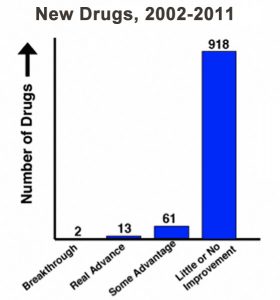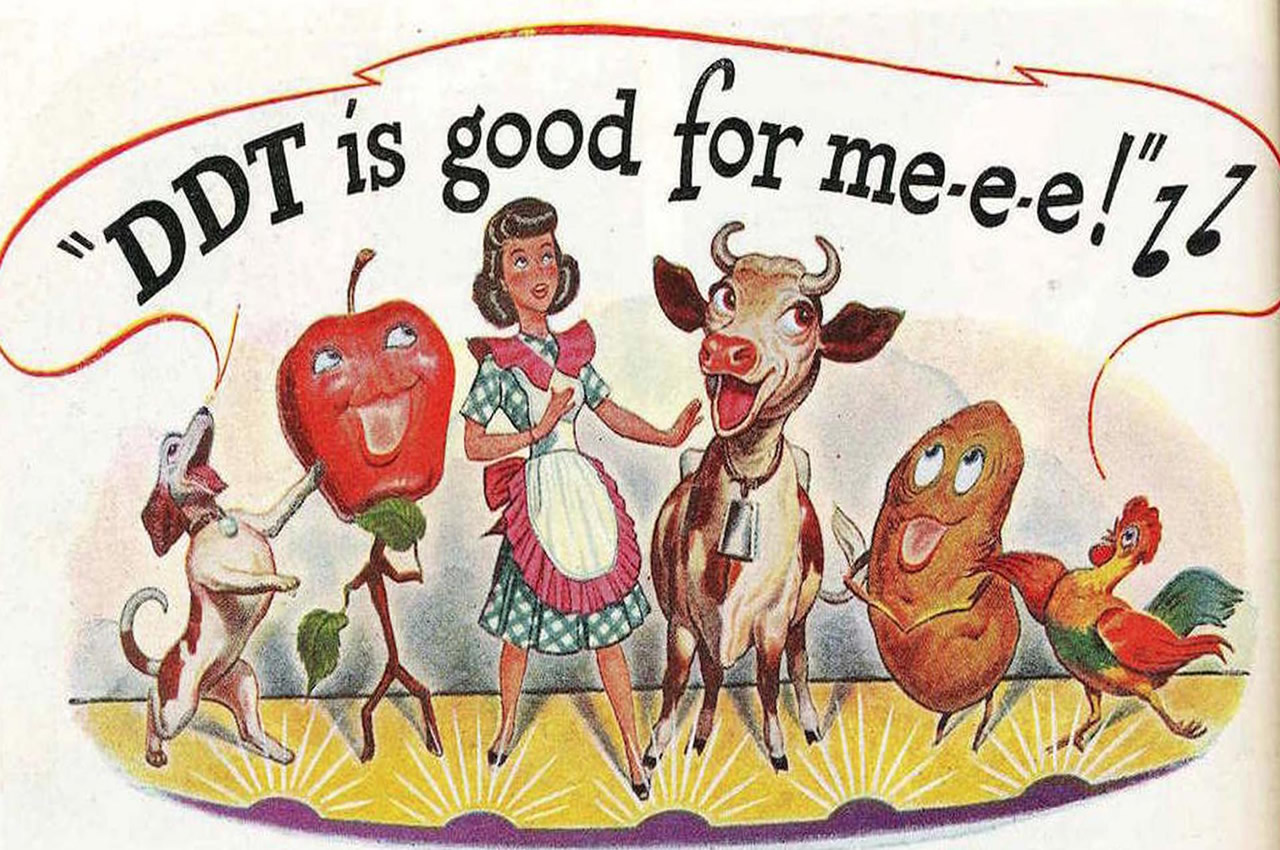“DDT is good for me-e-e-e!” was an ad campaign started in 1947. An estimated 1.8 million tons of DDT had been applied by the time its use in agriculture was curtailed by Congress in 1972.
At Seattle’s Earth Day March for Science, my sign carried a Switch Healthcare maxim:
Science + Wisdom = Better Decisions.
This formula is central in our efforts to achieve better health and lower healthcare costs.
In Conversations #2 and #9, I touched on how the legitimacy of medicine is under siege from industry directed research funding, biased health professional education, and effective lobbying of governmental agencies.
As science is challenged, the principles guiding better personal health decisions become even more important. In the next few Conversations, I’ll focus on pivotal principles that lay the foundation for better decision-making.
#1. The Precautionary Principle
This principle describes why it is prudent to be cautious about new products. Such caution should be considered a key component when seeking optimal health.
The precautionary principle makes sense when one considers the body’s extraordinary complexity. To maintain our basic metabolic balance requires each of our 40 trillion cells to perform nearly a billion dynamically interactive chemical reactions every second. Over millions of years this cellular complexity has evolved to create systems that can effectively repair our injuries and give us some protection when we are exposed to toxic substances.
Introducing new drugs into the body’s complex environment can certainly have unpredictable consequences on our health. To say the least, improving upon the body’s evolutionary status quo is a high bar.
Even after the FDA approval process, exposing oneself to a new medication risks the possibility of experiencing previously unreported side effects. When more than one drug is taken, drug interactions make such negative consequences even more likely.1
The case of lidocaine demonstrates how easy it is to fall into an over-treatment bias. After a heart attack, patients with increased PVC’s (a heart rhythm disturbance) have a higher probability of dying. Since lidocaine decreases the PVC’s, giving it became the standard of care to prevent death after a heart attack. However, subsequent research hasn’t convincingly shown that lidocaine works to prevent deaths in this situation2.
Since the healthcare system pays much more for something new, the financial pressure to support “progress” is unrelenting. Hence, new tests, procedures, and medications prematurely become the standard of care.3
As the graph below shows, the recent track record for newly approved drugs also supports a cautious approach.4

Caring physicians want to avoid the added risks of new drugs that provide little or no improvement. However, when a patient is primed to want a new medication by direct to consumer advertising, physicians find it difficult not to comply.5
Given these realities our Switch team works to:
- Remember the precautionary principle when the science is not independently confirmed or a drug is new but not a major advance, and
- Enhance the member’s capacity to improve their body’s ability to heal itself and stay healthy.
For Americans such a cautious approach is counterintuitive. Our collective bias is that something is better than nothing, newer is better than old, and more technology is better than less.
Such bias is a bad strategy in healthcare no matter what the dancing cow might sing.
Breakthrough To Better,
Carl
1New drugs offer more risk than benefits
2Study questions the prophylactic use of lidocaine
3Study examines the myth of safe and effective drugs
4France improves focus after Mediator scandal
5Doctors increasingly influenced by patient requests
____________________________________________________________________________________
Switch Conversations is a bi-weekly blog exclusively for our potential employer partners.
____________________________________________________________________________________
ALL POSTS:
Edition 1 – Solving a Well-Entrenched Problem
Edition 2 – A Case of Dr. Jekyll and Mr. Hyde
Edition 3 – Best marketing tagline of all time?
Edition 4 – Post-Truth Killed a President
Edition 5 – What’s an employer to do?
Edition 6 – Profiting From the Opioid Epidemic
Edition 7 – The Keys to Unlocking Better Decisions
Edition 8 – When Difficult Things Need to be Done Well
Edition 9 – Fixing Healthcare
Edition 10 – Beware of a Singing Cow
Edition 11 – Wise Reflections
Edition 12 – Warning: Reader Discretion Advised
Edition 13 – Can AI save healthcare? (Part 1)
Edition 14 – Can AI save healthcare? (Part 2)
Edition 15 – Can AI save healthcare? (Part 3)
Edition 16 – Embracing Reality to Improve Healthcare
Edition 17 – Everything I Needed To Know…
Edition 18 – The Eighth Circle of Hell
Edition 19 – So… What’s Our Solution?
Edition 20 – Protecting Integrity as a Core Strategy
Edition 21 – An Unadorned Legacy
Edition 22 – Time to Grow Up
Edition 23 – Against All Odds
Edition 24 – When Everyone Has Stopped Listening
Edition 25 – Focusing on What’s Important
Edition 26 – Don’t Give Up Your Shot
Edition 27 – Join the Goodhood
Edition 28 – Fixing Healthcare (Recycled)
Edition 29 – Taming the Healthcare Beast
Edition 30 – Leadership
Edition 31 – Better Health Requires Good Sense
Edition 32 – Little Decisions With Big Consequences
Edition 33 – Transformational Courage
Edition 34 – Transformational Courage – Part 2
Guest Post – Happy Thanksgiving! By Jeff Novick, RD
Edition 35 – Transformational Courage – Part 3


